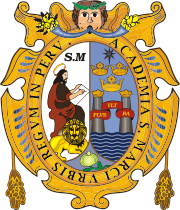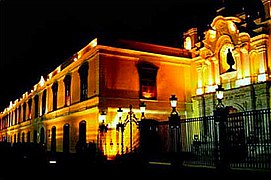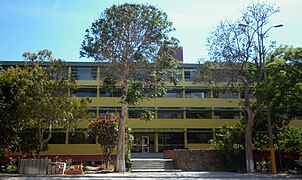National University of San Marcos
You can help expand this article with text translated from the corresponding article in Spanish. (December 2010) Click [show] for important translation instructions.
|
Universidad Nacional Mayor de San Marcos | |
 | |
| Latin: Academia S. Marci Vrbis Regvm in Perv | |
| Motto | Universidad del Perú, Decana de América |
|---|---|
Motto in English | University of Peru, Dean of the Americas |
| Type | Public |
| Established | May 12, 1551 |
| Rector | Pedro Cotillo Zegarra |
Academic staff | 2559 (full time) 674 (part time) |
| Undergraduates | 29,710 |
| Postgraduates | 3,549 |
| Location | , 12°03′30″S 77°05′00″W / 12.05833°S 77.08333°W |
| Campus | Urban 70 hectares (170 acres) (Main campus) |
| Colors | Gold Magenta White Steel blue |
| Mascot | Lion |
| Website | www.unmsm.edu.pe |
 | |
The National University of San Marcos (Template:Lang-es, UNMSM) is the most important and respected higher-education institution in Peru. It consistently ranks among the top two universities in the country.[1][2][3][4][5][6] Its main campus, the University City, is located in Lima. It was chartered on May 12, 1551 by a royal decree signed by Charles V, Holy Roman Emperor, which makes it the oldest officially established university in the Americas and, as such, one of the oldest universities in the world.[7] San Marcos has 60 academic-professional schools,[8] organized into 20 faculties, and 6 academic areas. All the faculties offer undergraduate and graduate degrees. The student body consists of over 30,000 undergraduate and 4,000 graduate students from all the country, as well as some international students. The university has a number of public institutions under its government such as the San Marcos Cultural Center and the Museum of Natural History of Lima.
San Marcos' prestige in Latin America mainly arises from its renowned faculty and alumni. It is the only university in Peru with a Nobel Prize laureate among its alumni: Mario Vargas Llosa (Literature). San Marcos is also recognized for the quality of its curricular contents, its very competitive admission process, as well as for being a leading center of scientific research.[9] Several Peruvian and Latin American influential thinkers, researchers, scientists, politicians and writers have studied there, which underscores San Marcos' leading role as an educational institution in the history of Peru and the world.
History
Oldest university in the Americas
San Marcos was officially established by a royal decree (signed by Charles V, Holy Roman Emperor) on May 12, 1551, and since then it has operated without interruption. Hence, it is known as the Dean of America ("dean" in the sense of "oldest member"). San Marcos also claims that according to the Archivo General de Indias, a famous Spanish repository of documents on the former colonies in the sixteenth to eighteenth centuries, there were no official records authorizing any other university or higher-education institution before 1551.[10] The Royal and Pontifical University of Mexico was chartered the same year as San Marcos (by a royal decree of September 21, 1551) as the Royal University of Mexico, making it the second oldest in the Americas.
Although the Autonomous University of Santo Domingo was founded in 1538, it was not officially recognized by Royal Decree until 1558, and, as many other universities in the Americas that closed during independence wars and other political conflicts, it was closed due to the occupations of the Dominican Republic by Haiti and then the United States. San Marcos often states the National University of Santo Domingo's founding Papal bull In Apostolatus culmine, was not officially recognized by the King of Spain at the time; hence making into an apocryphal document. The Peruvian institution also states that the document in question was discredited by Pope Paul III.[citation needed]
Organisation
Government
The university was originally headed by members of the clergy. During the Enlightenment, Bourbon reforms transformed it into a secular institution. Nowadays, the university is governed by:
- The University Council
- The University Assembly (composed of professors and students, with the latter holding a third of the seats).
- The Rector (president)
- Two Vice-Rectors:
- Academic Vice-Rector
- Vice-Rector of investigation.
Academic areas and faculties
The original faculties at San Marcos were Theology, Arts (the old Scholastic term for what is now known as academic Philosophy) and Law; Jurisprudence, and Medicine were added later in the colonial period. The Faculty of Natural Sciences and the Faculty of Economics and Commerce were created in the mid-19th century. The Faculty of Science was subdivided by specialities in the 20th century. The Faculty of Theology was closed in 1935.
In the mid-1990s San Marcos' departments were grouped into four academic blocks. Nowadays, San Marcos' faculties are grouped into 6 academic areas, as shown below.
Health sciences
Academic area I: Health sciences
- Faculty of Human Medicine:
- Faculty of Pharmacy and Biochemistry:
- Pharmacy & Biochemistry (merged)
- Food science
- Toxicology
- Faculty of Dentistry:
- Faculty of Veterinarian Medicine:
- Faculty of Psychology:
Humanities
Academic area II: Humanities
- Faculty of Letters and Human sciences:
- Faculty of Education:
- Kindergarten teaching
- Elementary School teaching
- High School teaching
- Physical Education
Social sciences
Academic area III: Social sciences
- Faculty of Law and Political science:
- Faculty of Social sciences:
Basic sciences

Academic area IV: Basic sciences
- Faculty of Chemistry and Chemical engineering:
- Faculty of Biological sciences:
- Biology
- Genetics & Biotechnology (merged)
- Microbiology & Parasitology (merged)
- Faculty of Physical sciences:
- Faculty of Mathematical sciences:
Engineering
Academic Block V: Engineering
- Faculty of Chemistry and Chemical engineering:
- Faculty of Physical Sciences:
- Faculty of Geology, Mining, Metallurgy and Geography engineering:
- Faculty of Industrial engineering:
- Faculty of Electronics and Electrical engineering:
- Faculty of Systems engineering:
Business sciences
Academic Block VI: Business sciences
- Faculty of Administrative sciences:
- Faculty of Accountancy Sciences:
- Faculty of Economic sciences:
Notable alumni and academics
See also Category:National University of San Marcos alumni and Category:National University of San Marcos faculty

- Carlos Monge Medrano, physician.
- Laura Esther Rodriguez Dulanto, the first female physician in Peru.
- Santiago Antúnez de Mayolo, engineer and scientist.
- José María Arguedas, novelist and anthropologist.
- Jorge Basadre, historian.
- Luis Bedoya Reyes, attorney, congressman, Mayor of Lima and founder of the Christian People's Party
- G. E. Berrios, professor of psychiatry at the University of Cambridge.
- Alfredo Bryce Echenique, novelist.
- Carlos Bustamante, biophysicist.
- Daniel Alcides Carrión, medical student and pioneer in medical research.
- Ramiro Castro de la Mata Caamaño, scientist.
- Carlos Manuel Chavez, heart surgeon.
- José Santos Chocano, poet.
- Antonio Cornejo-Polar, literary critic.
- Víctor Raúl Haya de la Torre, revolutionary thinker, founder of the American Popular Revolutionary Alliance (APRA)
- Cayetano Heredia, physician.
- Mariano Iberico Rodríguez, philosopher.
- Francisco Miró Quesada Cantuarias, philosopher and logician.
- Bernardo O'Higgins, military officer and first President of Chile.
- Valentín Paniagua Corazao, former President of Peru.
- Hugo Pesce, physician and leprosy specialist.
- Luis Alberto Sánchez, writer and statesman.
- Manuel Scorza, novelist.
- Julio C. Tello, archaeologist.
- Abraham Valdelomar, poet and short-story writer.
- Mario Vargas Llosa, novelist, Nobel Prize in Literature (2010).
- Federico Villarreal, scientist and mathematician.
- Bertha Bouroncle, physician.
Gallery
-
Oil painting commemorating the foundation of the University of Lima (later named San Marcos), officially the first university in Peru and America, and his manager Friar Tomas of San Martin.
-
The historic chapter house at the Convent of the Rosary of the Dominicans, where the University of San Marcos began its operations.
-
Drawing showing the old facade of the premises where the University of San Marcos functioned throughout the Peruvian viceroyalty. Later this place would be transferred to the nascent Congress of Peru.
-
The First Constitutional Congress of Peru was chaired by Toribio Rodríguez de Mendoza and held in the chapel of the University of San Marcos September 20 of 1822.
-
Local University of San Marcos in 1920, the famous "Casona de San Marcos is currently the Centro Cultural de San Marcos.
-
Welcome Mural Universidad Nacional Mayor de San Marcos, as he mentioned the official date of its foundation: May 12 of 1551.
-
"Casona" of San Marcos, used as the Cultural center
-
Jorge Basadre building, used for administrative functions
-
Main library
-
San Marcos University Press
-
San Marcos University Gym
-
San Marcos University Stadium
-
Metallica concert at University of San Marcos
-
Monument of Fray Tomas de San Martín
-
Main auditorium
-
San Marcos University Clinic
-
Institute Tropical Medicine
-
Museum of Natural History
See also
- List of colonial universities in Latin America
- History of the National University of San Marcos seal
References
- Cayo Códova, Percy (2004). Enciclopedia Temática del Perú. TOMO III: República (in Spanish). Lima, Perú: Orbis Ventures, El Comercio. ISBN 9972-752-03-8.
- Del Busto Duthurburu, José Antonio (2004). Enciclopedia Temática del Perú. TOMO II: Conquista y Virreinato (in Spanish). Lima, Perú: Orbis Ventures, El Comercio. ISBN 9972-752-02-X.
- De León Pinelo, Antonio (1631). Por la real Universidad y escuelas generales de S. Marcos de la ciudad de Lima, en las provincias del Perú (in Spanish). Madrid, España.
- Eguiguren Escudero, Luis Antonio (1949, 1959, 1951). Diccionario histórico-cronológico de la Real y Pontifica Universidad de San Marcos y sus colegios (in Spanish). Lima, Perú: Fondo Editorial de la UNMSM.
{{cite book}}: Check date values in:|year=(help)CS1 maint: year (link) - Eguiguren Escudero, Luis Antonio (1951). Historia de la Universidad. La universidad en el Siglo XVI (in Spanish). Lima, Perú: Fondo Editorial de la UNMSM.
- García Cáceres, Uriel (2004). Enciclopedia Temática del Perú. TOMO XII: Salud (in Spanish). Lima, Perú: Orbis Ventures, El Comercio. ISBN 9972-752-12-7.
- García Zárate, Óscar Augusto [compilador] (2003). Hacia una nueva universidad en el Perú (in Spanish). Lima, Perú: Fondo Editorial de la UNMSM.
- González Vigil, Ricardo (2004). Enciclopedia Temática del Perú. TOMO XIV: Literatura (in Spanish). Lima, Perú: Orbis Ventures, El Comercio. ISBN 9972-752-14-3.
- Higgins, James (2005). Lima: A cultural history. Nueva York, EEUU: Oxford University Press. ISBN 0-19-517890-4.
- Maticorena Estrada, Miguel (2000). San Marcos de Lima, Universidad Decana de América, una argumentación histórica-jurídica y el derecho indiano (in Spanish). Lima, Perú: Fondo Editorial de la UNMSM.
- Porras Barrenechea, Raúl (2010). San Marcos y la cultura peruana: Mito, tradición e historia del Perú (in Spanish). Lima, Perú: Fondo Editorial de la UNMSM.
- Sánchez Sánchez, Luis Alberto (1961). La universidad no es una isla... Un estudio, un plan, y tres discursos (in Spanish). Lima, Perú: Ediciones Perú.
- Universidad Nacional Mayor de San Marcos (2007). Catálogo Universitario y Prospecto de Admisión 2008-II (in Spanish). Lima, Perú: Centro de Producción e Imprenta de la UNMSM.
- Universidad Nacional Mayor de San Marcos (2010). Catálogo Universitario y Prospecto de Admisión 2011-I (in Spanish). Lima, Perú: Centro de Producción e Imprenta de la UNMSM.
- Valcárcel Esparza, Carlos Daniel (1981). Historia de la Universidad de San Marcos (1551–1980) (in Spanish). Caracas: Academia Nacional de la Historia.
- Valcárcel Esparza, Carlos Daniel (2001). San Marcos, Universidad Decana de América ([http://sisbib.unmsm.edu.pe/bibvirtual/books/historia/san_marcos/Indice.htm digitalizado]) (in Spanish). Lima, Perú: Fondo Editorial de la UNMSM. ISBN 9972-46-140-8.
{{cite book}}: External link in|title= - López Soria, José Ignacio; et al. (2004). Enciclopedia Temática del Perú. TOMO XI: Ciencia y Tecnología (in Spanish). Lima, Perú: Orbis Ventures, El Comercio. ISBN 9972-752-11-9.
- Peña Rodríguez, Víctor Antonio; et al. (2002). La Producción científica en San Marcos (1995-2001) (in Spanish). Lima, Perú: Fondo Editorial de la UNMSM.
- Summerfield, Carol J.; et al. (1998). International Dictionary of University Histories. Chicago, Illinois, EEUU: Fitzroy Dearborn Publishers. ISBN 1-884964-23-0.
Notes
- ^ "Ranking universitario en el Perú" (PDF). Asamblea Nacional de Rectores (ANR) and UNESCO. Retrieved 11 February 2013.
- ^ "QS Latin American University Rankings 2013". Retrieved July 24, 2013.
{{cite web}}: Unknown parameter|deadurl=ignored (|url-status=suggested) (help) - ^ "University Ranking by Academic Performance (2013): Top Perú". URAP Center. Retrieved July 24, 2013.
- ^ "Ranking Web of Universities: Peru". Webometrics. Retrieved July 4, 2013.
- ^ "SIR World Report 2013" (PDF). SCImago. Retrieved July 24, 2013.
- ^ "UNMSM recibe acreditación internacional". Peru21. Accessed April 26, 2011. Template:Es icon
- ^ "Foundation of the University of Lima". San Marcos National University. Accessed August 22, 2009. Template:Es icon
- ^ http://www.unmsm.edu.pe/sanmarcosaldia/semanarios/165.pdf
- ^ Ranking and research supported by: UNESCO and Asamblea Nacional de Rectores, 2007
- ^ http://sisbib.unmsm.edu.pe/bibvirtual/libros/historia/San_marcos/Fund_Uni_Sto_Domin.htm

















